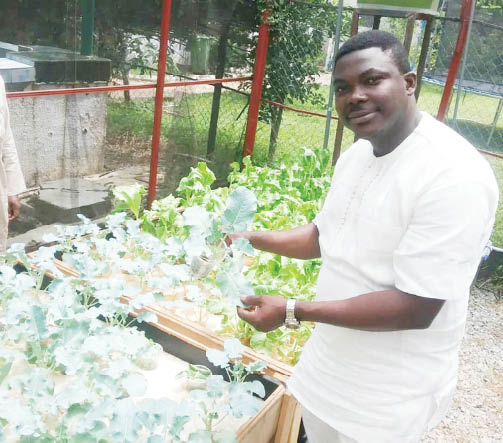Local farmers will find it difficult to embrace hydroponic farming
An agriculturist, Mr. Ismail Olawale, has said local farmers in Nigeria may not be ready to practice the hydroponic farming system despite its multi-faceted benefits. Mr. Olawale, a fellow at the Nigerian Agriculture and Extension Liaison Service (NAERLS) Zaria, said this in an interview with the News Agency of Nigeria (NAN) in Lagos. He said […]

Mr Adebowale Onafowora reportedly introduced soiless farming into the Nigerian Agricultural space in 2013
An agriculturist, Mr. Ismail Olawale, has said local farmers in Nigeria may not be ready to practice the hydroponic farming system despite its multi-faceted benefits.
Mr. Olawale, a fellow at the Nigerian Agriculture and Extension Liaison Service (NAERLS) Zaria, said this in an interview with the News Agency of Nigeria (NAN) in Lagos.
He said hydroponic farming was a very sensitive farming system that required much attention, adding that it was not just something any farmer could dabble into because of the processes involved in its practice.
NAN reports that hydroponic farming is a technological method that is gradually gaining ground across the world, especially in countries without adequate land.
It involves the growing of plants without soil by using mineral nutrient solutions in a water solvent.
Olawale revealed that the cumbersome and attention-demanding nature of hydroponic farming system would not make it easy for local farmers to adopt.
“Hydroponic farming involves the system of farming that does not necessarily need soil to thrive, but a system of water tubes.
“It is mostly practiced in areas where there is land problem or a lot of soil infertility or rocky areas where you cannot really do land cultivation farming.
“As an expert in the field, I will say the average local farmer in Nigeria is not ready for hydroponic farming because of its cumbersome nature.
“Nigerian farmers are not ready to practice hydroponic farming at a commercial level because of the process involved in the system.
“Hydroponic farming is a great innovation in farming, but in Nigeria, I do not see it as an alternative for conventional farming yet. It cannot serve as an alternative for food production and food security in Nigeria at the stage we are in now,” the agriculturist said.
